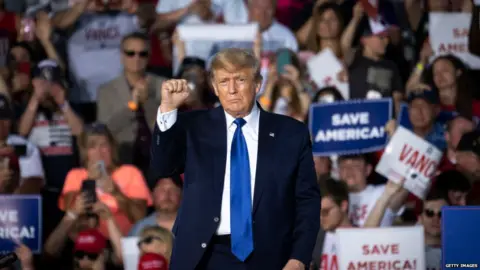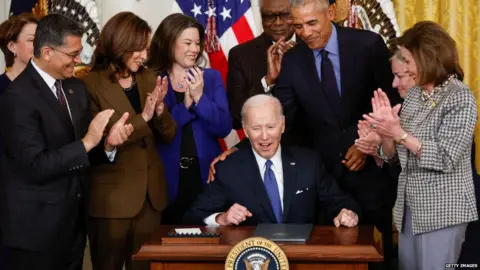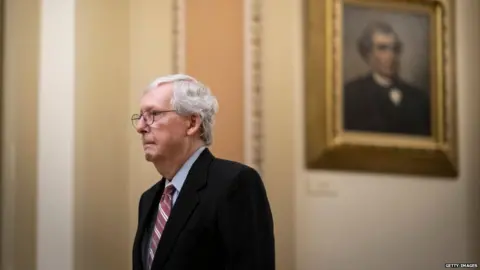US midterm elections: What will Republicans do if they win Congress?

 Getty Images
Getty ImagesThe Republican party is widely expected to win back at least one chamber of Congress in the mid-term elections later this year. But its leaders have been reluctant to say what it would do with that power — and that could mean trouble in the not-so-long run.
Some Republican 2024 presidential hopefuls have each released multi-point policy agendas that they may try to build a campaign around. But those in the Republican congressional leadership seem to believe that the path to power will be smoother if they keep the details of their agenda intentionally vague. It keeps their party united and gives Democrats less of a target to attack.
For the seventh time in 22 years, control of at least one chamber of the US Congress appears poised to switch to the opposing party, and this time, it's the Republicans who have the upper hand.
According to polls, a plurality of Americans plan to vote for Republican congressional candidates - a good sign of impending success. And they only need to flip a handful of seats to take control.
History suggests that, for them, there are two paths to victory - rallying around an agenda that gets conservative blood pumping, or uniting against a president with whom voters have become annoyed after two years.
The former happened in 1994, when Republicans around the country embraced Newt Gingrich's "Contract with America". The pitch spelled out laws and reforms the party would pass, and they won the House of Representatives for the first time in 40 years.
But in 2022, the Republicans look like they will be taking the playbook from a more recent mid-term. In 2014, they took control of the Senate with a campaign that primarily featured attacks on then-President Obama and warnings about the domestic threat posed by Ebola virus and Islamic State militants.
This year, the Republican Party leadership seems to have settled on a similar path. That means focusing its messaging on dissatisfaction with President Joe Biden and the Democrats, rather than advancing a particular governing agenda.
What will that mean if they do win in November?
Confusion all around
When asked in January what his party would do if it regained control of Congress next year, Senator Mitch McConnell - who would in all likelihood run the chamber if Republicans prevail - was coy.
"That is a very good question," he said. "And I'll let you know when we take it back".
In the House, it's a similar problem. Minority Leader Kevin McCarthy has set up a taskforce to come up with a campaign agenda - something easier said than done. When it was attempted prior to the party's national convention in 2020, Republicans were unable to agree on an electoral platform - the US political equivalent of a British party manifesto. The platform for the re-election of Donald Trump was instead simply a renewal of the 2016 document, even with its dated references to Barack Obama and the "failed" incumbent president.
The apparent lack of focus is being felt by the rank-and-file voters whose enthusiasm the party will need in November.
At the February Conservative Political Action Conference, or CPAC, a gathering of right-wing activists and politicians in Florida, more than one attendee was unimpressed.
"I come to CPAC, and I hear a lot of blah, blah, blah, blah, blah," said Florida resident Bernita Gigowski. "And I just want to yell out, 'but you've been in office for 10 or 12 years and what have you done?'"
"The Republican Party is currently going through some growing pains," said Daniel Hopping, a college student attending the conference.
The lack of a cohesive Republican platform is, in part, a reflection of the changes the party has undergone since Mr Trump won the presidency in 2016, said Mr Hopping.
"We're becoming more of a populist, limited-government, culturally-sound party rather than just, 'let's just cut taxes and have a nice trade deal or something.'"
 Getty Images
Getty ImagesAs was the case for the Democrats during the Trump years, a common foe can help cover obscure intra-party fault lines.
Among Republicans, the divides between the party's big-business, corporate interests, the Christian evangelicals and the white working-class voters who flocked to Mr Trump's America-First rhetoric have been smoothed over but still run deep.
But that temporary unity is fragile, and comes with risks.
After Republicans won the Senate and held the House of Representatives in 2014, dissatisfaction among rank-and-file voters - particularly on issues such as trade and immigration - may have contributed to the success of Donald Trump's anti-establishment presidential campaign. Those divides haven't entirely vanished, and if Republicans take power next year, acrimony over the direction of the party on social issues, trade, foreign policy and immigration could re-emerge.
Agendas going nowhere
The policy void at the top of the Republican Party leadership has presented an opportunity for some of the party's 2024 presidential hopefuls, however.
Former Vice-President Mike Pence is the most recent contender to try his hand at party agenda-setting.
This year, he unveiled a 19-page policy plan, touting what he calls "patriotic education" for US students.
It also proposes barring transgender athletes from competing against women, rescinding China's preferred trade status with the US, closer regulation of social media companies and making Trump-era corporate tax cuts permanent.
At least so far, though, Mr Pence's efforts have been met with polite interest bordering on indifference.
"Politically innovative, it isn't," sniffed MSNBC's Steve Benen.
Mr Pence's efforts have gone better than those of Florida Senator Rick Scott's 11-point "Plan to Rescue America", though.
His proposal, which touched on hot-button social issues like banning abortion and requiring students to say the US pledge of allegiance at school, has already been excoriated by Democrats and triggered a dispute within the Republican party.
 Getty Images
Getty ImagesDemocrats have seized upon one aspect of the plan - requiring all Americans to pay at least a nominal amount of income taxes - casting the proposal as a de facto tax increase on tens of millions of low-income workers.
That set up a clash between Mr McConnell, the Republican senate leader, who told reporters: "We will not have as part of our agenda a bill that raises taxes on half the American people" - a direct reference to Mr Scott's proposal.
Contracts and Priorities
One of the benefits of the "Contract With America" plan that Republican House candidates rallied around in 1994 was that, when Republicans took power, they had a clearly outlined governing agenda. Some of it proved controversial, but the party leaders were able to quickly bring legislation to the floor for votes.
 Getty Images
Getty ImagesWith a fractured party in 2022, however, there is no such cohesion up and down the Republican ranks.
In the Senate, Mr McConnell has said that his priorities would be addressing "inflation, energy, defence, the border and crime".
In the House, besides his taskforce, Mr McCarthy has said he wants to prioritise a "parents' bill of rights".
Mr Scott and Mr Pence, both eying the White House, have their plans.
Meanwhile, Republican voters have their own priorities. According to a survey of CPAC attendees, the top priorities for the party was election security - a sign that Mr Trump's continued challenging of his 2020 defeat still resonated with the base. They also listed constitutional rights (free speech, gun rights, etc.), immigration, and "reopening the economy" after Covid restrictions as important.
A national poll conducted by CBS in April found the economy, immigration and crime as the highest priorities for Republicans.
Republicans may agree that defeating the Democrats is the top priority right now, but come next year the party could be pulled in a hundred different directions. That could present challenges, as the party faithful could be presented with a range of candidates seeking the party's 2024 presidential nomination, each with their own set of policy proposals and priorities.
That has all the ingredients for a contentious, and possibly damaging, Republican primary season.
